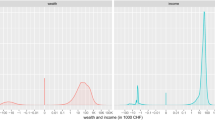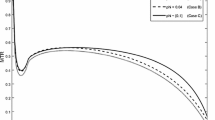Abstract
This paper examines heterogeneous effects of uncertainty of the U.S. tax policies across income classes. We construct a multi-class general equilibrium stochastic OLG model with a stochastic process of effective tax rates. In accordance with empirical evidence, the model includes two types of families: a high-income family, whose members have bequest motives and share risks; and a low-income family, whose members do not. Some notable results are as follows: (i) under a CRRA preference the efficient allocation of resources within family generates the same proportional standard deviation of consumption and leisure among family members; (ii) the welfare cost of the uncertainty of a tax policy is higher for the low-income family than for the high-income family: the cost for the low-lifetime-income family is about 145% of that for the high-lifetime-income family; Finally, (iii) the absolute level of the welfare cost for the whole population is shown to be about 0.53% of GNP, which is higher than the welfare cost measures by previous research such as Bizer and Judd (1989) and Skinner (1988).
Similar content being viewed by others
References
Altonji, J., F. Hayashi and L.Kotlikoff. (1991). "Risk-Sharing, Altruism and the Factor Structure of Consumption." NBER Working Paper No. 3834.
Altonji, J., F. Hayashi and L. Kotlikoff. (1992). "Is the Extended Family Altruistically Linked? Direct Tests Using Micro Data." American Economic Review 82, 1177–1198.
Auerbach, A. and L. Kotlikoff. (1987). Dynamic Fiscal Policy. Cambridge University Press.
Barro, R. (1974). "Are Government Bonds Net Wealth?" Journal of Political Economy 82, 1095–1117.
Benveniste, L. M. and J. A. Scheinkman. (1979). "On the Differentibility of theValue Function in Dynamic Models of Economics." Econometrica 47, 727–732.
Behrman, J. R. and P. Taubman. (1985). "Intergenerational Earnings Mobility in the United States: Some Estimate and a Test of Becker's Intergenerational Endowments Model." Review of Economic Studies 67, 144–151.
Bielby, W. and M. R. Hauser. (1977). "Response Error in Earnings Functions for Nonblack Males." Sociological Methods and Research 6, 241–280.
Bizer, D. and K. Judd. (1989). "Taxation and Uncertainty." American Economic Review 79, 331–336.
Calvo, G. A. and M. Obsfeld. (1988). "Optimal Time-Consistent Fiscal Policy with Finite Lifetimes: Analysis and Extensions." Chapter 10 of Economic Effect of Government Budget, Helpman, E., A. Razin and E. Sadka (eds.), MIT Press, Cambridge, Massachusetts.
Cochrane, J. H. (1991). "A Simple Test of Consumption Insurance." Journal of Political Economy 99, 957–976.
Cooley, T. and C. E. Prescott. (1995). "Economic Growth and Business Cycles." Frontiers of Business Cycle Research, Cooley, T. (ed.), Princeton University Press.
Chun, Y. J. (1994), "Risky Taxation in an Overlapping Generations Model." mimeo, University of Pennsylvania.
Chun, Y. J. (1993). "Fiscal Deficit, Social Security and Interest Rate-A Causality Test." mimeo, University of Pennsylvania.
Fullerton, D. and L. D. Rogers. (1993). WhoBears the Lifetime Tax Burden?. The Brookings Institution, Washington D.C.
Geweke, J. (1982). "Measurement of Linear Dependence and Feedback Between Multiple Time Series." Journal of American Statistical Association 77, 304–324.
Hansen, G. D. and C. E. Precott. (1995). "Recursive Method of Computing Equilibria of Business Cycle Models." Thomas, F. C. (ed.), Frontiers of Business Cycle Researches. Princeton University Press.
Hurd, G. H. (1989). "Mortality Risks and Bequests." Economerica 57, 173–209.
Joines, D. (1982). "Estimates of Effective Marginal Tax Rates on Factor Incomes." Journal of Business 54, 191–226.
Kotlikoff, L. and L. Summers. (1981). "The Role of Intergenerational Transfers in Aggregate Capital Accumulation." Journal of Political Economy 89, 706–732.
Laitner, J. and F. T. Juster. (1996). "New Evidence on Altruism: A Study of TIAA-CREF Retirees." American Economic Review 86, 893–908.
Mace, B. J. (1991). "Full Insurance in the Presence of Aggregate Uncertainty." Journal of Political Economy 99, 928–956.
Nelson, N. (1994). "On Testing for Full Insurance Using Consumer Expenditure Survey (Comment)." Journal of Political Economy 103, 384–394.
Moon, H. P. (1989). "Redistributive Capital Taxation in a Two-Class Overlapping Generations Model." Chapter 2 of Ph.D dissertation, University of Pennsylvania.
Solon, G. (1992). "Intergenerational Income Mobility in the United States." American Economic Review 82, 393–408.
Rios-Rull, J. V. (1996). "Life Cycle Economies and Aggregate Fluctuation." Review of Economic Studies 63, 465–489.
Sewell, W. H. and M. R. Hauser. (1975). Education, Occupation, and Earnings: Achievement in the Early Career, New York: Academic Press.
Skinner, J. (1988). "The Welfare Cost of Uncertain Tax Policy." Journal of Public Economics 37, 129–145.
Wolff, E. (1987). "Estimates of Household Wealth Inequalities in the U.S." 1962–1983, Review of Income and Wealth, 231–257.
Zimmerman, J. D. (1992). "Regression Toward Mediocrity in Economic Stature." American Economic Review 82, 409–429.
Author information
Authors and Affiliations
Rights and permissions
About this article
Cite this article
Chun, Y.J. The Redistributive Effect of Risky Taxation. International Tax and Public Finance 8, 433–454 (2001). https://doi.org/10.1023/A:1011271008229
Issue Date:
DOI: https://doi.org/10.1023/A:1011271008229




